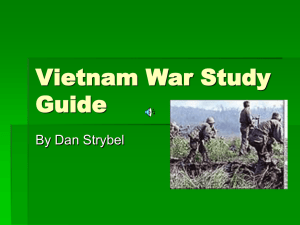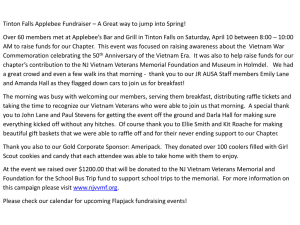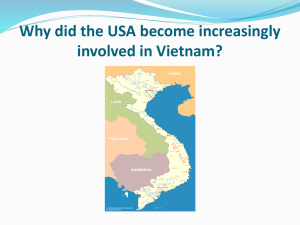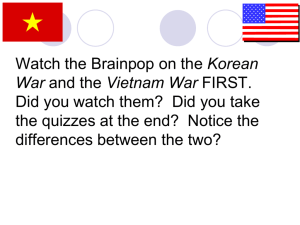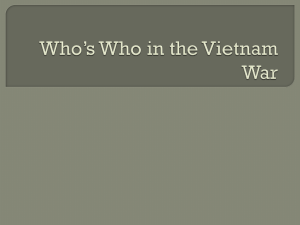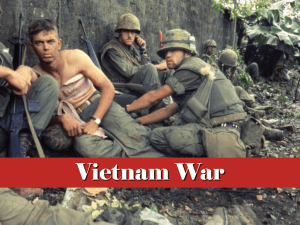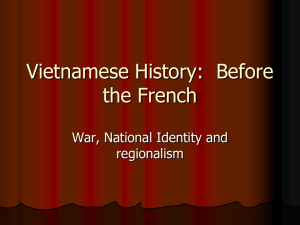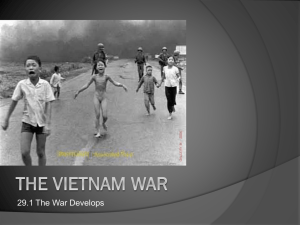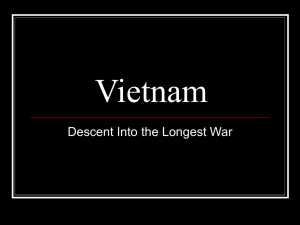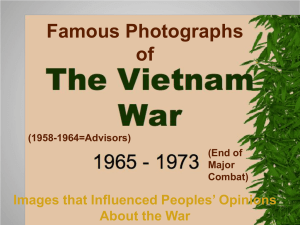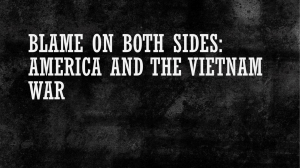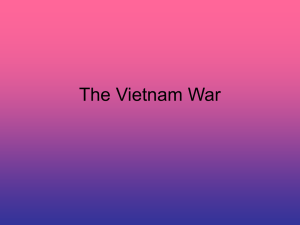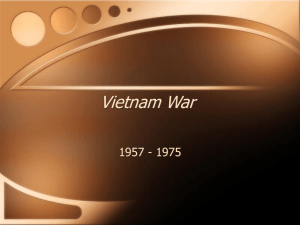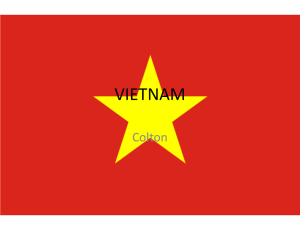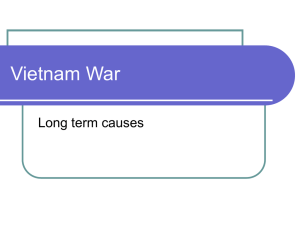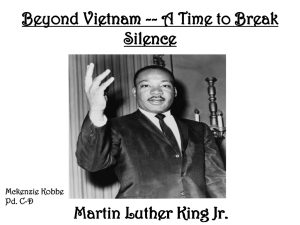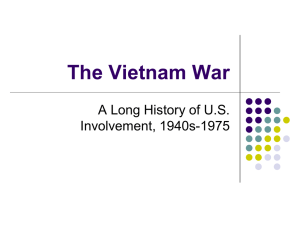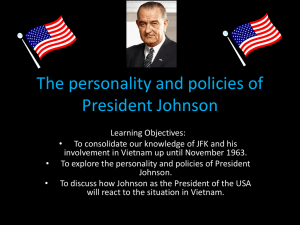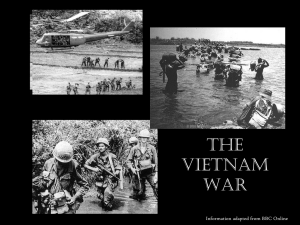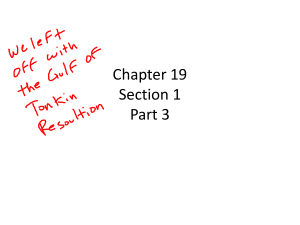Secret War
advertisement
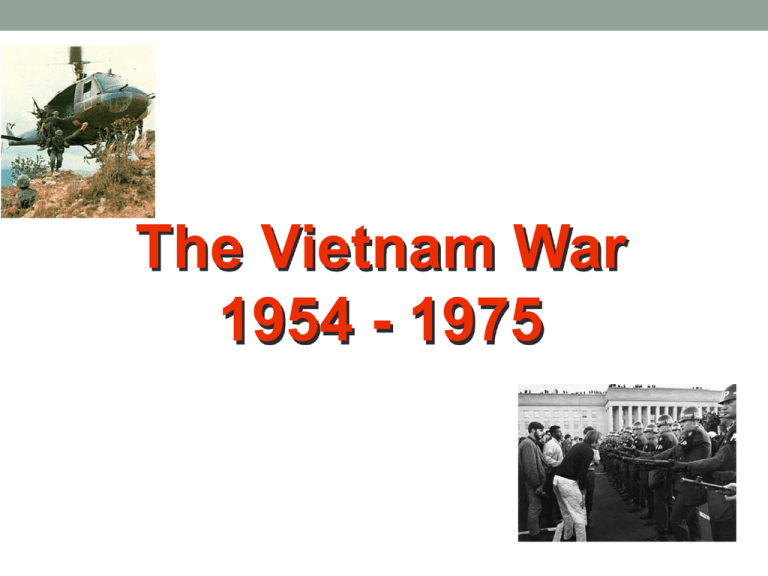
The Vietnam War 1954 - 1975 Background to the War The French lost control to Ho Chi Minh’s Viet Minh forces in 1954 at battle of Dien Bien Phu Peace Conference :Geneva Vietnam was divided at 17th parallel O Ho Chi Minh: leader of nationalist forces controlled the North O Ngo Dinh Diem: French-educated, Catholic. Claimed control of the South Background to the War A date was set for democratic elections to reunify Vietnam Diem backed out of the elections, leading to military conflict between North and South U.S. Military Involvement Begins Dictatorial rule by Diem Diem’s family holds all power Wealth is hoarded by the elite Buddhist majority persecuted Torture, lack of political freedom prevail The U.S. aided Diem’s government 675 U.S. Army advisors sent by 1960. Early Protests of Diem’s Government Self-immolation by a Buddhist Monk U.S. Military Involvement Begins Kennedy increases military “advisors” to 16,000 1963: Diem’s unpopularity worries JFK US supports military coup d’etat ARVN (Army of the Republic of Vietnam) ARVN overthrew the government on November 1, 1963. Diem and his brother are murdered (Nov. 2) Johnson Sends Ground Forces Remembers Truman’s “loss” of China Domino Theory revived I’m not going to be the president who saw Southeast Asia go the way China went. Johnson Sends Ground Forces Advised to rout the communists by Secretary of Defense, Robert S. McNamara Tonkin Gulf Incident 1964 (acc. to Johnson, the attacks were unprovoked) Tonkin Gulf Resolution “The Blank Check” * A joint resolution of Congress What is a Joint Resolution? Gave Johnson authorization for war - without a formal declaration of war U.S. Troop Deployments in Vietnam 600,000 500,000 400,000 U.S. Troops 300,000 200,000 100,000 1961 1963 1964 1965 1966 1967 1968 0 The Ground War 1965-1968 No clear territorial goals for the US. Body counts on TV every night (first “living room” war) Viet Cong supplies war via the Ho Chi Minh Trail a path from North Vietnam to South Vietnam via Laos & Cambodia . The Air War 1965-1968 1965: Sustained bombing of North Vietnam Operation Rolling Thunder (March 2, 1965) 1966-68: Ongoing bombing of Hanoi nonstop for 3 years. targets the Ho Chi Minh Trail. Carpet Bombing – napalm The Air War: A Napalm Attack Who Is the Enemy? Vietcong: Farmers by day; guerillas at night. Willing to accept many casualties. US underestimated resolve and resourcefulness. The guerilla wins if he does not lose, the conventional army loses if it does not win. -- Mao Zedong The Tet Offensive, January 1968 N. Vietnamese Army + Viet Cong attack South simultaneously (67,000 attack 100 cities, bases, and the US embassy in Saigon) Take every major southern city U.S. + ARVN beat back the offensive Viet Cong all but destroyed N. Vietnamese army debilitated BUT the IMPACT…. The Tet Offensive, January 1968 Impact of the Tet Offensive Domestic U.S. Reaction: Disbelief, Anger, Distrust of Johnson Administration Johnson’s popularity dropped in 1968 from 48% to 36%. ‘Hey, Hey LBJ! How many kids did you kill today?’ Are We Becoming the Enemy? Charlie Company, 1st Battalion, 20th Infantry Mylai Massacre, 1968 200-500 unarmed villagers Lt. William Calley, Platoon Leader Convicted of premeditated murder of 22 Vietnamese civilians. Calley was sentenced to life imprisonment at hard labor 1968 Presidential Election – A Critical Election: The Era of Divided Government Nixon on Vietnam Nixon’s campaign promised : Peace with Honor Vietnamization: Encouraged the South Vietnamese to take more responsibility for fighting the war. Hoped to enable the United States to withdraw (gradually) from ‘Nam The “Secret War” Cambodia – US forces famously invade & bomb. Destabilize the nation. Laos “Pentagon Papers,” 1971 Former defense analyst Daniel Ellsberg leaked govt. docs. about the Johnson administration and Vietnam New York Times. Docs. Govt. misled Congress & Americans about Vietnam during mid-1960s. Fighting not to eliminate communism, but to avoid humiliating defeat. The Ceasefire, 1973 Peace is at hand Kissinger, 1972 North Vietnam attacks South Most Massive U.S. bombing commences 1973: Ceasefire signed between U.S., South Vietnam, & North Vietnam Peace with honor (President Nixon) The Ceasefire, 1973 Conditions: 1. U.S. to remove all troops 2. North Vietnam could leave troops already in S.V. 3. North Vietnam would resume war 4. No provision for POWs or MIAs Last American troops left South Vietnam on March 29, 1973 1975: North Vietnam defeats South Vietnam Saigon renamed Ho Chi Minh City The Fall of Saigon April 30, 1975 America Abandons Its Embassy The Costs 1. 3,000,000 Vietnamese killed 2. 58,000 Americans killed; 300,000 wounded 3. Under-funding of Great Society programs 4. $150,000,000,000 in U.S. spending 5. U.S. morale, self-confidence, trust of government, decimated The Impact 26th Amendment: 18-year-olds vote Nixon abolished the draft all-volunteer army War Powers Act, 1973 ٭ President must notify Congress within 48 hours of deploying military force President must withdraw forces unless he gains Congressional approval within 90 days
